An Introduction to Genealogy Research in Wroclaw and Lower Silesia
Updated: 26/01/2024
/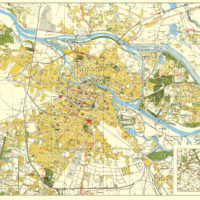
Genealogy Research and Wroclaw are tied quite closely together. Why? We already highlighted in our article about the history of Wroclaw that a full exchange of population happened after the Second World War in 1945, that is why we will not get here into the details again.
However, many German families have roots in Lower Silesia as it used to be one of the former German territories and today is part of the Republic of Poland. That makes it obvious that there is a huge interest for genealogy research around Wroclaw and Silesia.
In today‘s post we would like to provide an overview of some great resources available online and offline for that. Naturally, many sources will be only available in German language, just as a heads up.
Where to start with Genealogy in Wroclaw?
As you can imagine, this topic is super broad as not only Wroclaw is a subject for many genealogy researchers, but also the whole of (Lower) Silesia and other former German areas. We created five sections which we believe can be helpful to introduce you to the topic of genealogy:
1) Let‘s start easy – how did Wroclaw look like back in the days?
First of all, we will give you a general overview of the former German Breslau – showing you how to find old streets of Breslau/Wroclaw. This is an easy start if you have a former German address in Wroclaw you just want to visit. There are some good maps out there, in particular a mixed German-Polish version.
2) Advanced Genealogy in Wroclaw – Researching documents
Second, we will point out where to do research for old documents if you already have an idea what you are looking for. There are multiple institutions available to support your research. Here we will try to make a compilation of them and describe what they have available. Many address books from the pre-war period were actually scanned and are available in digital libraries.
3) Genealogy platforms – a mix of fun, science and research
Third, we will talk about one of the online genealogy platforms and our own experience with it. These platforms can help you to keep track of your family tree but also provide some DNA analysis. With such analysis made, you will be able to not only find out your ethnic origins but also find distant relatives all over the world who made the test as well.
4) More resources dedicated to Genealogy
Forth, we have compiled a list of more useful resources that you can use to get lost in the Lower Silesia and Wroclaw genealogy research. Many great websites have large amounts of resources and further links, we want to provide you a starting point to find out more about your ancestors.
5) A final note from us – knocking on strangers doors
And finally, we will be closing this post with a personal note if you plan to visit Lower Silesia and Wroclaw to see where your ancestors lived back in the days and plan to knock on some random doors.
1. Old City Maps of Breslau/Wroclaw
You want to visit your ancestors and just have a German address available? That should not be too difficult, at least to get to the same physical place. However, it might be a different question if the building survived the war or the layout of the street has changed…
We found a quite useful „dual“ city map of Wroclaw. Actually it is two maps in one! On the left side you see Breslau 1932 with all German names and on the right you have today‘s city with all descriptions in Polish. In addition you will find two bi-lingual smaller maps of the old town area and the area around the Centennial Hall.
Having Polish and German street names in Wroclaw available in one map makes navigation much easier when you actually are here and walk around.
This combined Wroclaw/Breslau map can be purchased from Amazon.de here (free shipping, the map itself is normally just a couple of Euros) or directly from Blochplan here. Thanks to Blochplan for permitting us to include the preview-pictures here!
Although we personally prefer the map which has both German and Polish street names and descriptions, we don‘t want to hide the fact that there are many other old maps of Wroclaw/Breslau available, like the ones from Pharus-Plan. They might be useful if you are looking specifically for different years and the development in between. Here a preview:
Die hier gezeigten Pläne sind Pharus-Pläne, zu beziehen unter www.pharus-plan.de
The maps are also available on Amazon.de, for example here you get to the 1941 Breslau map.
Old Street names from Breslau/Wroclaw
You just have an old German street name from Breslau and quickly want to find out the new Polish street name in Wroclaw?
Well, there are two different options to figure out more:
- Get the map which we just recommended as it has a street register with all German/Polish street names and the indication how to find it quickly.
- We compiled a list of all German and Polish street names in Wroclaw here.
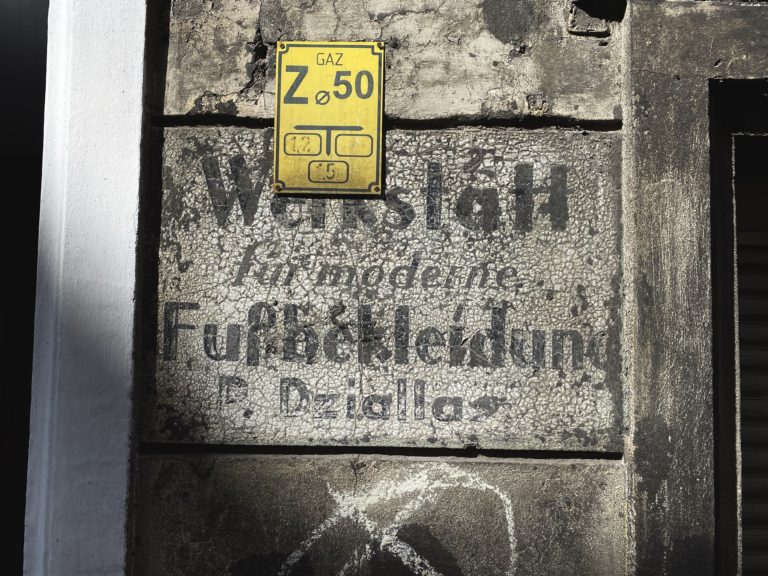
While you are roaming around the city, looking for your ancestors, you might also be interested in old traces of German history.
There is a quite unique phenomenon in Wroclaw where old paint comes off from buildings and old German signs are getting visible again.
For that, we created a fully free self-guided walking tour through Nadodrze. This tour can be done virtually from home, but also physically and real via build-in navigation features.
2. Institutions for Genealogy Research in Wroclaw
There are multiple institutions in Wroclaw (and online, too!) where you can get access to old documents, here is a selection of the most important ones. Further below in this post, you will find some other great websites with content about genealogy in Silesia.
As you might expect, there are many subject matter experts out there and this topic is broad enough to fill own websites!
Helpful institutions related to genealogy in Wroclaw
State Archive
- Mostly documents before 1913 are available here
- https://www.ap.wroc.pl/
Registry Office
- More than one million German registry documents are kept here and still every year there are remarks made in documents from people who were born back in Breslau before 1945
- Documents are stored here for 100 years and then usually they are transferred to the state archive
- https://bip.um.wroc.pl/artykul/227/3173/urzad-stanu-cywilnego
Churches
Address books from Breslau/Wroclaw
- The Silesian Digital Library has an extensive selection here made available online
- Many different years are available and even special versions like farm registers and many more
- https://www.sbc.org.pl/dlibra
- Here more information on how to find out where people expelled from Wroclaw moved to
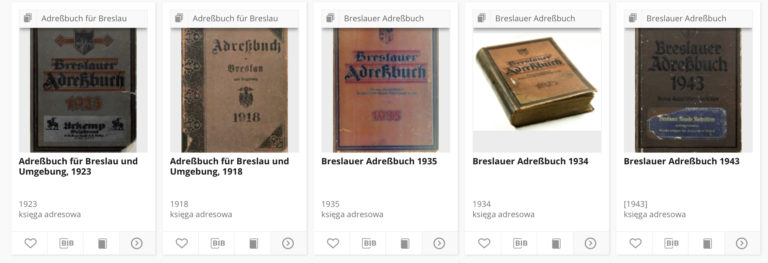
City Arsenal and City Museum
- The City Arsenal holds building permits and documents till 1945
- The City Museum holds various exhibits from the over 1000 year long history of Wroclaw
- Link for both: https://muzeum.miejskie.wroclaw.pl/
University Library
- This is the link of the „physical“ University Library in Wroclaw: https://www.bu.uni.wroc.pl/
- However many documents were digitalised and are available online, like scanned address books etc.
- Just searching for „Breslau“ gives you around 40.000 digital documents
- Link to the digital offer: https://www.bibliotekacyfrowa.pl/dlibra
Old Photos and Pictures from Wroclaw and Poland
- More Information how to find old photographies from Wroclaw here (in German language only)
3. MyHeritage DNA test and database
Another interesting option for Genealogy Research which we can recommend is the platform „MyHeritage“.
Probably you already have heard about this company, they keep a huge database of DNA records and many genealogy researchers from the global community are engaged here.
There are actually three good reasons why this platform is so popular, and we will tell you why.

1) Build your own interactive Family Tree
Have you ever considered to create your own family tree? If yes, you certainly found out how difficult it is to find a good piece of software to build a family tree. Some of the programs are outdated and quite expensive.
With MyHeritage you can create an interactive family tree which makes it easy to keep the overview. Lot of diagrams and statistics are available. But the best is, that you can collaborate with other members of your family in this genealogy tool. Did we mention that for up to 250 entries it is fully free?
Link: www.myheritage.de – Here you can start your own family tree online for free!
2) The ethic origin DNA Heritage Test
You might have heard about this option to have your DNA tested for genealogy research… If you are interested, there are two main reasons why it is a quite cool thing:
1) You will receive a DNA analysis of your ethnicity , telling you how much % of you is e.g. Baltic, West-European, Scandinavian, etc.
We did this DNA test ourselves and honestly were quite surprised. You are not always what you think you are! The test kit is shipped to you, then you swap your cheeks at home and send it to the lab. After a few weeks, you get your results, it is as easy as that!
2) If you want to, your DNA can be added to the myHeritage database and you will see other people who made this test and most likely are relatives of yours! We checked this option too and again were very surprised in which parts of the world we have (distant) relatives.
The best part is, that these tests used to cost many hundred Euros but got much cheaper the last years as technology has advanced. The standard test price is around 80 Euros, however most of the time there are promotions available and you can get it already for around 40-60 EUR:
Click here to check the current promotions and offers for the DNA Heritage Test!
This is how a result could look like:
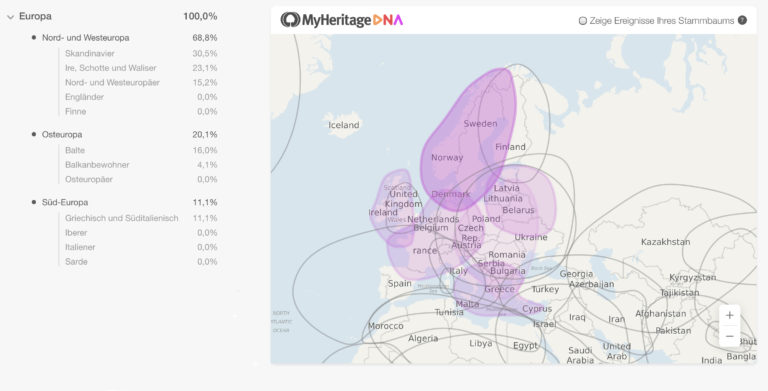
3) Genealogy Research Database
If you are really serious about the research, then they also provide a database of 12,7 billion historical records! This should be enough to find out more about your roots, however this is only part of the paid plans, so we cannot make any statements on that. If anybody has experience with that database specifically for Silesia, please let us know in the comment field below…
4. Other useful Silesia genealogy resources online
This post just intends to provide you an initial overview of the topic and should provide basic guidance. However, if you want to start further and very specific research, then you will need much more detailed information depending on the area you want to research.
To help with that, we have compiled a list of additional resources which are available online and might be further starting points for your investigation on your family history, genealogy research or just curiosity about your ancestors.
As mentioned, most sources will be only available in German, however we believe it provides some value to include them here anyway.
Here are some more advanced starting points for genealogy research around Wroclaw and Silesia:
- Family Research in Silesia (christoph-www.de)
- A compilation of address book links, regular meetings and a guestbook/forum where very friendly people are trying to help (breslau-wroclaw.de)
- A huge list of many relevant links regarding Silesia (myheimat.de)
- Mailing-List for exchange specifically on Lower Silesia genealogy (genealogy.net)
- Quite active forum with many threads about Silesia and Wroclaw (Ahnenforschung.net)
- Breslau on GenWiki – with a great link list on birth/death/marriage certificates per year
Again, the World Wide Web is endless but we found the pages above to be quite extensive and useful. If you have suggestions for other to be added, please use the contact form or comment box below. With specific research requests we also suggest to direct them directly to these forums and mailing lists.
5. Knocking on strangers doors - a note from us
Imagine the following situation. On a Sunday afternoon, you and your family are relaxing together on the couch and suddenly the doorbell rings. Strange, as you do not expect any visitors?
You open the door and some people are talking to you in a very excited way, but in a language that you do not understand.
They point at you, at your house, at your personal items they can see through the door and keep telling you the same words which you simply do not understand.
How would you feel and react?
This is the situation that happens quite frequently in Lower Silesia and other former parts of Germany, which today are Polish. German visitors who are trying to trace down their past and family history are knocking on doors and trying to get in touch with the new inhabitants, but are not able to express themselves.
Personally, we probably would not feel to comfortable in that situation as the ones being visited and assume that many people feel similar. We just would like to emphasise: Be aware of that. If you plan that, try to bring somebody along with you who does speak Polish or contact some of the local organisations before. They will gladly help you and most likely even have good information regarding the local attitudes on some villages.
We know a lot of stories where new Polish owners of old German houses are in very good friendship with the previous owners. This is what can make us proud as European citizens today.
We hope that you enjoyed this introduction to genealogy research in Wroclaw!
Maybe you want to plan a trip to Wroclaw? Here you can find all our planning guides for a great trip to Wroclaw!
Do you have some comments on this article? Further good resources that will be helpful? Help us and also help other visitors by leaving your feedback in the comment section below!
You may also like
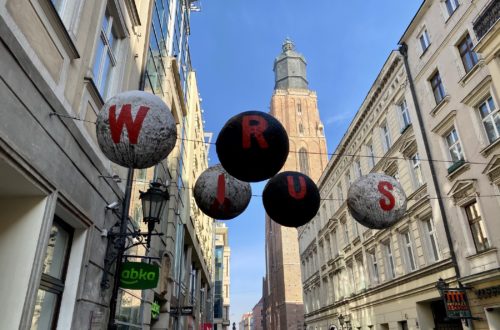
What are the current Coronavirus restrictions in Wroclaw 2022?
25/03/2022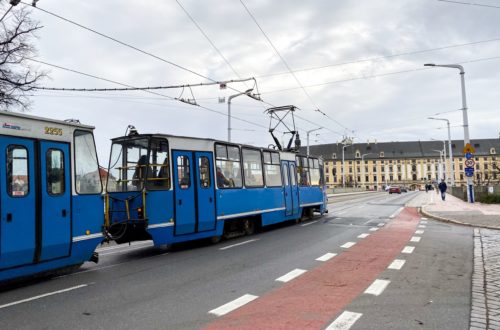
More than just bus and tram – all about public transport in Wroclaw
08/09/2023











